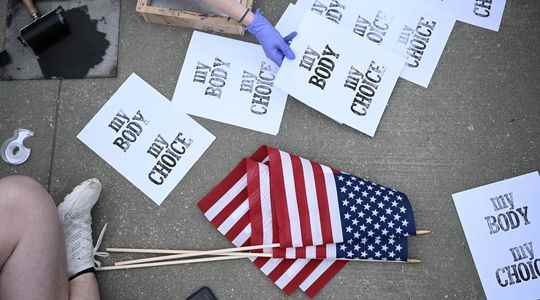The document “leaked” by Politico has had the effect of a bomb and never stops sending shock waves. The news site published a draft Supreme Court decision, still under discussion, that would overturn the landmark Roe v. Wade of 1973 recognizing the right to abortion. If the highest court confirmed the text (still under negotiation), it would erase fifty years of case law and put an end to a constitutional right that protects women. It would also be a considerable victory for the conservatives, for whom the ban on abortion has become a real obsession and who have been struggling for years to have the decree repealed. Marjorie Taylor Greene, Representative of Georgia and super Trumpist, called the text “the best news of our existence”. And to add: “It is a great victory for God.”
“This decision will be a game-changer for America,” said Gregory Meeks, a Democrat elected to the House of Representatives. And first for women. The United States would find itself in the situation before 1973, when each state was free to prohibit or authorize abortions. Abortion would almost immediately be banned or drastically restricted in half of the states. In several of them, the law does not even provide for exceptions in the event of rape, incest or fetal abnormality.
Following the Texas model, Oklahoma has just passed a law that prohibits abortion after six weeks, at a time when many women are still unaware that they are pregnant. It can then only be authorized if the life of the mother is deemed to be in danger. Millions of women in the southern and midwestern states (northeast of the country) will now have to travel hundreds of miles to find a clinic in another state. However, the majority of these American women come from poor and minority backgrounds and therefore often do not have the means to go far.
The legitimacy of the Supreme Court in question
But the draft goes “way beyond” abortion, President Joe Biden said. It potentially calls into question “a whole series” of other rights, such as gay marriage or contraception. In short, it threatens to upset many societal achievements. It also throws a little more discredit on the Supreme Court, whose reputation is already badly tarnished. In March, news emerged of the potential conflict of interest of Clarence Thomas, one of the conservative justices who refused to recuse himself on election-related cases as his wife campaigned to keep Donald Trump in power.
For several years, the Court has been seen by many Americans as increasingly politicized. The appointment by Donald Trump of three judges from the Christian right has not helped. The leak of this preliminary draft – an extremely rare event – reinforces the idea of a dysfunctional institution and raises questions about its legitimacy.
A turning point at six months midterms ?
With midterm elections next November, the impact of this extraordinary decision could be felt at the ballot box. “I think it should have an impact in November because the cancellation of Roe vs. Wade, and especially the fact that there is no exception for rape and incest, is unpopular even among Republicans,” said Robert Erikson, professor of political science at Columbia University. According to a CNN poll in January, 69% of Americans are opposed to the cancellation of the right to abortion.
The Democrats hope that this decision will mobilize their base, which is much less motivated than that of the Republicans to vote. And will allow them to limit the defeat expected in the fall. They immediately attacked the Republicans as dangerous retrogrades. “Only Democrats will protect your freedoms. This is now the central choice in the 2022 election,” Rep. Sean Patrick Maloney tweeted.
Privately, however, some are less optimistic. It is not certain that abortion is a priority for the mothers of moderate families who live in the peri-urban suburbs, because the rise in prices, the war in Ukraine or even the content of school curricula are already mobilizing their minds to a great extent. The Republican Party, for its part, sent instructions to Senate candidates advising them to insist on the extreme views of the Democrats. About twenty states authorize abortion until “fetal viability”, around 24 weeks. [NDLR : contre 14 semaines en France]. They hope, by shifting the debate on late abortions, to attract votes, including moderates. According to another poll, 65% of Americans are in favor of a ban on abortion in the second trimester of pregnancy.
Democrats have few options to oppose the court’s decision other than to pass a bill in Congress to legalize elective pregnancy intervention. An unrealistic scenario given the narrow majority of Joe Biden’s party in Congress. In the meantime, America is left with a patchwork of laws. Democratic states are rushing to pass measures to maintain the legality of abortion and protect the clinics that practice it. The Conservatives have already taken the next step and are tweaking laws to prevent women from having abortions in the neighboring state or from receiving the two pills, including RU 486, which provides 50 % of abortions today. “These laws will accentuate legal conflicts between states, increase divisions and cut the country in two,” says Mary Ziegler, author of several books on the right to abortion and professor at Florida State University. Moreover, the debate on the American political system is reopened. Because it is five judges, including four appointed by George W. Bush and Donald Trump who are behind the possible ban on abortion. However, these two presidents were each elected without having won the popular vote.
